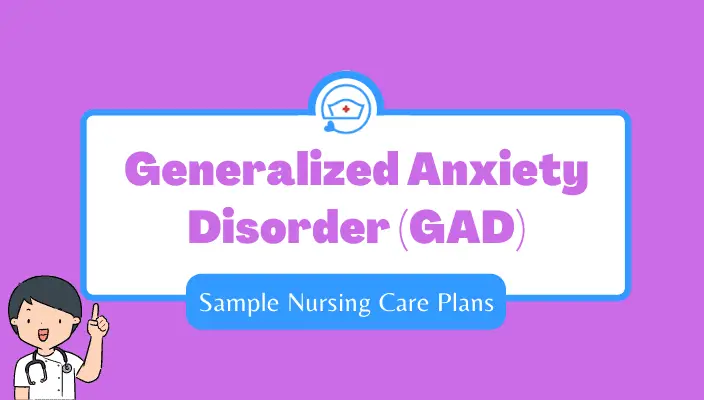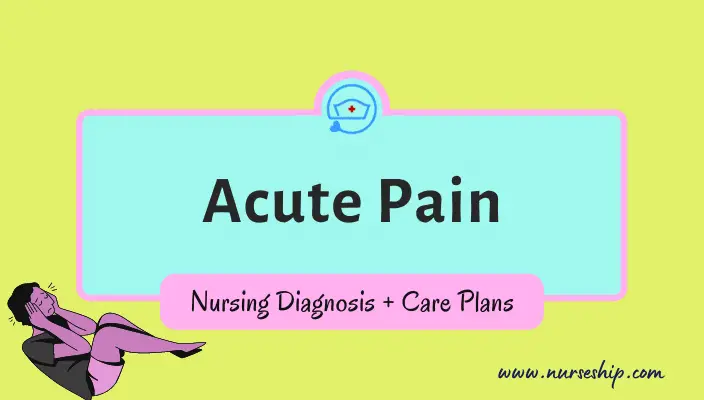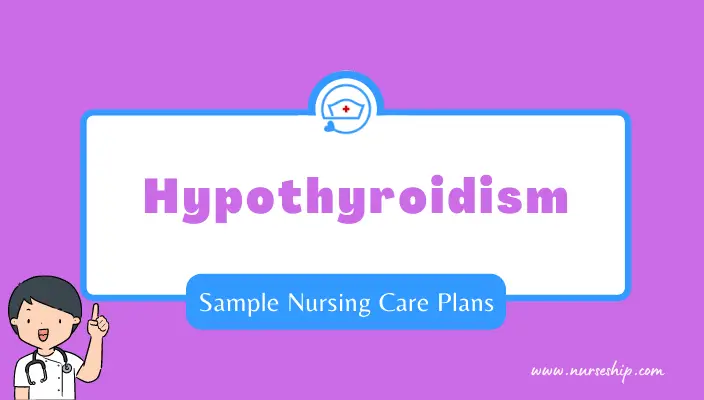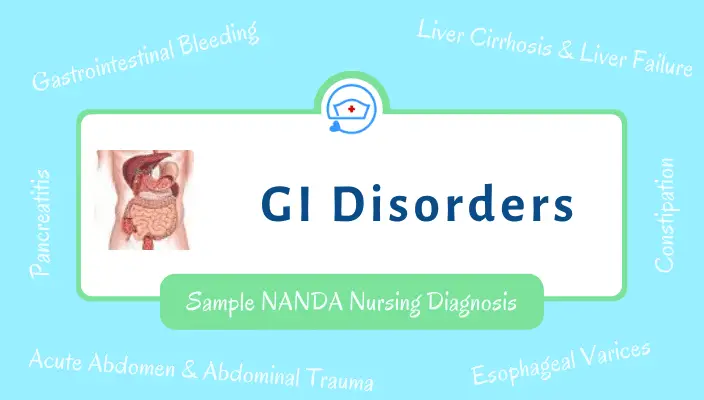Here we’ll create a scenario-based sample nursing care plan for Generalized Anxiety Disorder (GAD). It will include nursing assessment, nursing diagnosis, desired outcome/goal, and nursing interventions with rationale for Generalized Anxiety Disorder.
Generalized Anxiety Disorder Case Scenario
A 34-year-old woman presents to the ED with complaints of chest pain, shortness of breath, and severe anxiety. The patient has a past medical history of depression and hypothyroidism.
During the interview, the patient reveals that her significant other recently died in a motor vehicle accident.
The patient reports feeling overwhelmed and scared and feels a sense of impending doom. She also reports being unable to sleep and says, “she hasn’t slept more than an hour for weeks now.”
Upon assessment, the patient appears restless and diaphoretic. She is observed rocking back and forth, repeating, “I’m not okay, I’m not okay.” She is alert and oriented x4 and follows commands appropriately.
The nurse uses the Hamilton Anxiety Rating Scale to grade the patient’s anxiety, and the patient scores a 27, indicating moderate to severe anxiety.
Her temperature is 37.5 C, heart rate is 114 BPM, blood pressure 128/83 mmHg, respirations 35 breaths per minute, and SPO2 of 98% on room air.
The patient’s blood work is within normal limits, and her cardiac enzymes and troponin levels are normal. A 12-lead EKG is performed, revealing sinus tachycardia with no evidence of ischemia or infarction.
The patient is admitted to the hospital for Generalized Anxiety Disorder.
#1 Sample Nursing Care Plan for Generalized Anxiety Disorder – Ineffective coping
Nursing Assessment
Subjective Data:
- The patient reports chest pain, shortness of breath, and anxiety
Objective Data:
- The patient’s partner suddenly passed away a few weeks ago
- The patient is tachycardic and tachypneic
- She scored 27 on the Hamilton Anxiety Rating Scale
Nursing Diagnosis
Ineffective coping related to the situational crisis as evidenced by tachycardia, tachypnea, and reports of chest pain and shortness of breath.
Goal/Desired Outcome
Short-term goal: By the end of the shift the patient will experience a reduction in anxiety and relief of chest pain and shortness of breath
Long-term goal: The patient will have several coping strategies to utilize if and when anxiety arises
Nursing interventions with rationales for Generalized Anxiety Disorder – Ineffective coping
| Nursing Interventions | Rationales |
| Utilize therapeutic verbal and non-verbal communication strategies | Empathy and active listening are strategies the nurse can use to support the patient |
| Encourage expression of emotions and verbalization of fears and concerns | Open communication and non-judgment are effective strategies to support the patient through a crisis |
| Help the patient set realistic goals and develop a plan for meeting those goals | Goal-setting and self-monitoring can increase successful coping. |
| Educate the patient about various types of coping strategies, such as 1. Cognitive-behavioral therapy 2. Mindfulness 3. Meditation 4. Positive self-talk 5. Guided imagery Yoga | All of the following coping strategies can decrease anxiety and depression |
| Educate the patient on social-support resources | Resources such as bereavement groups can decrease anxiety and improve feelings of loneliness |
#2 Sample Nursing Care Plan for Generalized Anxiety Disorder – Impaired mood regulation
Nursing Assessment
Subjective Data:
- The patient reports chest pain, shortness of breath, and anxiety
- The patient reports a history of depression
Objective Data:
- The patient is tachycardic and tachypneic
- She scored 27 on the Hamilton Anxiety Rating Scale
Nursing Diagnosis
Impaired mood regulation related to anxiety and history of depression as evidenced by tachycardia, tachypnea, and score of 27 on the Hamilton Anxiety Rating Scale
Goal/Desired Outcome
Short-term goal: By the end of the shift the patient will score less than 17 on the Hamilton Anxiety Rating Scale
Long-term goal: The patient will report a decrease in the frequency and severity of anxious thoughts
Nursing interventions with rationales for Generalized Anxiety Disorder – Impaired mood regulation
| Nursing Interventions | Rationales |
| Continue to assess anxiety using an objective rating scale such as the Hamilton Anxiety Rating Scale. | Using a rating scale helps detect improvement or worsening in anxiety levels and can help guide patient care. |
| Assess for depression or suicidal ideation. | It’s essential to assess for depression and/or suicidal ideation to help determine the treatment course and ensure patient safety. |
| If applicable, provide anxiolytics such as Benzodiazepines, Barbiturates, Non-benzodiazepine drugs, and Beta-blockers | Anxiolytics are prescribed to help reduce feelings of anxiety. Because these drugs are habit-forming, they should ideally be taken short-term |
| Monitor for adverse effects of anxiolytics. | Side effects of anxiolytics include slurred speech, bradycardia, hypotension, or confusion. |
| Assess for withdrawal from alcohol, nicotine, or other substances. | Substance withdrawal can exacerbate anxiety and depression. |
#3 Sample Nursing Care Plan for Generalized Anxiety Disorder – Insomnia
Nursing Assessment
Subjective Data:
- The patient reports difficulty sleeping
- The patient states she “hasn’t slept more than an hour for weeks now.”
Objective Data:
- The patient is tachycardic and tachypneic
- She scored 27 on the Hamilton Anxiety Rating Scale
Nursing Diagnosis
Insomnia related to anxiety and grieving as evidenced by an inability to sleep more than an hour
Goal/Desired Outcome
Short-term goal: By the end of the shift, the patient will have rested for at least 2 to 3 hours
Long-term goal: The patient can list several strategies to help with insomnia and reports feeling more rested
Nursing interventions with rationales for Generalized Anxiety Disorder – Insomnia
| Nursing Interventions | Rationales |
| If applicable, administer medication to encourage sleep. | Sleeping medication may be required for severe insomnia not relieved by other non-pharmacologic strategies. These medications are also habit-forming, and the patient should be encouraged to limit their use. Non-addictive medications such as melatonin may also be helpful. |
| Educate the patient on how to create a positive sleep environment. | An environment that encourages sleep is ideally dark, quiet, and free from interruptions. Eye masks and earplugs can be used to aid sleep. |
| Educate the patient on dietary changes to help with sleeping. | The patient should avoid caffeine at night and may benefit from consuming herbal teas before bed. |
| Instruct the patient to avoid screens and blue light before bed. | The use of electronic devices before bed delays falling asleep and leads to less restful sleep. |
| Assess for the presence of sleep apnea. | Sleep apnea is a sleep disorder characterized by the stopping and restarting of breathing during sleep. It can cause snoring and poor, restless sleep. If suspected, the patient should be referred to a sleep clinic. |
Conclusion
To conclude, here we have formulated a scenario-based nursing care plan for Generalized Anxiety Disorder (GAD). Prioritized nursing diagnosis includes ineffective coping, impaired mood regulation, and insomnia.
Additionally, this sample Generalized Anxiety Disorder nursing care plan comprises nursing assessment, NANDA nursing diagnosis, goal, and interventions with rationales.
Recommended Readings & References
Herdman, T., Kamitsuru, S. & Lopes, C. (2021). NURSING DIAGNOSES: Definitions and Classifications 2021-2023 (12th ed.). Thieme.
Schultz, J., & Videbeck, S. (2013). Lippincott’s Manual of Psychiatric Nursing Care Plans (9th ed.). Wolters Kluwer Health | Lippincott Williams & Wilkins.
Townsend, M. (2015). Psychiatric Nursing: Assessment, Care Plans, and Medications (9th ed.). F. A. Davis Company.




